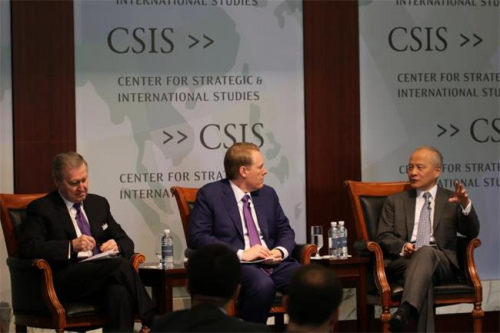
Cui Tiankai, China's Ambassador to the United States,talks with William Cohen (left), former Secretary of Defense, and Christopher K. Johnson (center), Senior Adviser and Freeman Chair in China Studies, CSIS at a forum marking "Forty Years of U.S.-China Relations" on May 11, 2018. (Photo by Zhao Huanxin/China Daily USA)
"It was Satchel Paige who said, 'Don't look back; (because) something may be gaining on you'," said William Cohen, former Secretary of Defense, citing the baseball Hall of Famer. "We're looking back, and it is China."
"Well, if you look back, you're only looking at the past; if you look forward, you're looking at the future," said Cui Tiankai, China's Ambassador to the United States.
What Cohen and Cui said on Friday in downtown Washington at a luncheon marking "Forty Years of U.S.-China Relations" seems to reflect the mindset of many people in seeing the status quo and direction of the relationship between the world's top two economies.
For Cui, the key to success of the relations in the past four decades has been identification of the growing common interests, ranging from strategic interests from the onset, to economic ties, and then to emerging global challenges including climate change, counterterrorism and denuclearization.
"We do have differences or sometimes crises between our two countries, because we are two very different countries, and I don't know whether it's fortunately or unfortunately, we never run out of problems," Cui said at the forum held by the Center for Strategic & International Studies.
"I agree with Senator Cohen that what has enabled us to overcome all the difficulties was dialogue, communication and real efforts to try to understand the other side's perspective, and look for practical ways of solving a problem," he said.
For Cohen, Chinese leaders had a clear picture of what it wanted for its people from the start of the opening up and reform, as seen from his first visit to China in 1978, when preparations for forging formal diplomatic relations were in full swing. He met Deng Xiaoping for the first time.
Describing Deng as "non-stop" smoker literally "blowing smoke" in the meeting room, Cohen said, "He wasn't blowing smoke in terms of his vision for China that he decided that the Cultural Revolution had been a disaster for China, and now they had to move into an open market system, and unleash the power of the Chinese people, their work ethic, their intellectual capital, their drive to succeed and to open up."
Forty years later, China's change has been the most dramatic transformation of any society in the history of mankind in the shortest period of time, Cohen said, adding that he believed China's "hybrid type of economic system" is causing the challenge.
Cohen also mentioned the Thucydides trap – "We're all looking at how do you manage a rising power coming into a competition and potentially conflict with the existing power."
Cui said he had long conversations with Graham Allison, who coined the term Thucydides Trap. The Harvard professor concluded that over the past 500 years, of the 16 cases in which a rising power challenging a ruling one, war broke out in twelve of them, and four were cases of peaceful transition of power.
"We should certainly not be the 13th case that will end up in a war and conflict, but neither should we follow exactly the example of these four peaceful transitions," Cui said.
"It has nothing to do with transfer of global dominance from the U.S. to China," the ambassador said. "We want to become a good partner."
Cohen said that anytime a conflict or real difference arises, "then you have to sit down and talk about ways you can afford crossing the lines, and to keep the relationship going, so it's engagement".
Cohen also said no one can contain China and the U.S. "shouldn't try to contain it". Instead, he said the U.S. might be "in a position to help restrain China", arguing that no one power should have absolute power without any restraints.
Cui said there is increasing competition between the two countries. Despite of the debates on the recurring topics of engagement versus confrontation, engagement should still be the right choice.
"I think maybe we can look at the example of sports. If we want to run faster, you don't look over your shoulder to see if somebody is catching up," Cui said. "You could feel somebody catching up. This will force you to run even faster.
"We should all try to run faster ourselves, not always be looking back to see if somebody is coming and try to raise some barriers to stop him."


















































